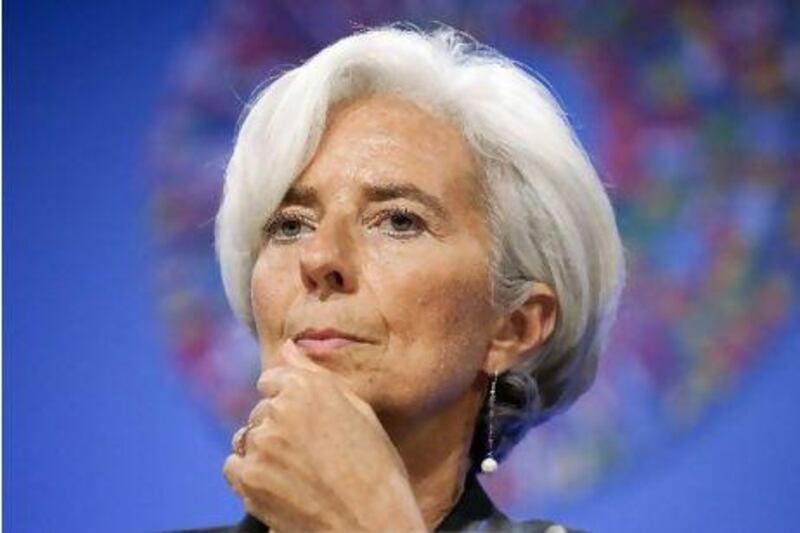It is said that the history of the world would be different if Queen Cleopatra of Egypt had been blessed with a nose half an inch longer. Julius Caesar and Mark Antony would probably have turned their own well-formed noses up at her and the Roman state would never have split into civil war. Augustus, rather than being an emperor, would probably have carved out a nice career as a civil servant, or possibly a gardener.
I am beginning to think that in our times a similar event may be having even graver consequences, although I suspect it was not necessarily the nose of the young lady that was the cause of the problem. The events in that notorious Sofitel Hotel room in New York a few months ago that led to the arrest of Dominique Strauss-Kahn and his eventual resignation as head of the IMF a few days later could ensure that Europe, along with much of the rest of the world, remains in recession for the next 10 years.
Fanciful? I was flicking through American Vogueyesterday morning, essential reading for all economists. Are hemlines going up or down? Is lipstick still the only accessory that sells in a recession, or has lip-gloss outshone it?
And there, among the frocks - Mad Men style is very much in fashion this season, I'm pleased to report - was a piece on Christine Lagarde, the former French finance minister who became the new boss of the IMF. She convinced everybody that she would bring honour and dignity back to the position. That's all very well, but what I'd also like to see is a little imagination and not necessarily an old-fashioned approach to a serious problem.
She looks well enough, her legs stretched out in stockings, her hair nicely coiffed. She may even be a great team player, she was a synchronised swimmer in her youth, but can she think for herself?
So far she has said nothing to reassure me, talking instead like a German with a French accent, treating economics as a morality tale, and putting me for once in the same camp as the rather batty Paul Krugman, the Nobel Prize-winning economist and columnist for The New York Times.
"By all accounts she's serious, responsible and judicious," he told Vogue. "But that, of course, is what worries me. For we're living in an era in which, for the time being, conventional prudence is folly, conventional virtue is vice."
Plus, he added, is grey really the colour of the season every season? Why doesn't she dye her hair red like all other French women of her age? OK, I made that last bit up, but Mr Krugman's point is that while it may seem obvious to stop spending money when you don't have any, if you do that as an economy, the consequences are grave. The situation just gets worse.
You only have to see and hear what is going on in Greece to realise why these draconian policies - ironic that Dracon was an Athenian - will not work. Crime is soaring. My friend has returned from there and tells me that her parent's car has been repeatedly broken into. Her mother no longer wears any jewellery. They live in a good part of town but many of the nearby restaurants and cafes are now boarded up. There are strikes every day listed in the newspaper.
"I'm so pleased that I learned to speak Greek," my friend says, "even though I thought there might be more useful languages I should be studying. But now I can read the paper every morning and know when to avoid certain places."
Despite all the disruption, Greece enjoyed a bumper haul of tourists this summer, with many visitors from the Gulf preferring to risk travel chaos rather than say, the threat of fighting in Lebanon.
But that is unlikely to continue. As the mood turns uglier in Athens, the tourists will stay away. Not only that, but the young Athenians, a whole generation, will decide to go and live somewhere else. They are said to be moving to Germany, but also to Australia and Canada, two countries with large Greek communities.
And it is not just the Greeks on the move. Many of the peripheral parts of Europe are abandoning their homelands, with more Irish said to be leaving than at any time since the 19th century. And the Portuguese are heading to Brazil and Angola.
Can you blame them? Who would want to be a 20-year-old graduate faced with having to clean up this mess and pay absurdly high taxes in the slim prospect that you got a job? Emirati graduates can expect a starting salary of Dh32,000 a month, more than US$104,000 a year, and that's just the basic. You don't see many of them emigrating, apart from to Europe and the US during the hot summer months.
Whatever you think of Strauss-Kahn's behaviour, and I suspect that few think very much of it at all, it is beginning to look like he was the right man in the right place at the right time. He appears to have had the combination of charm, bluff and foresight to steer Europe through this crisis. The trouble is he ran into the wrong woman at the wrong time in the wrong place. Just like Mark Antony.





